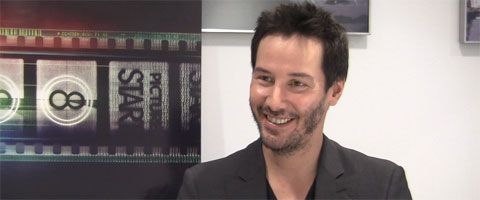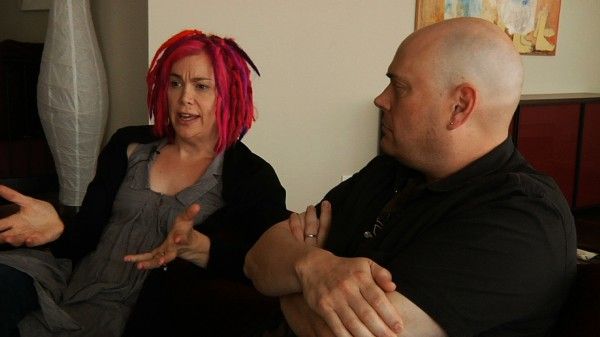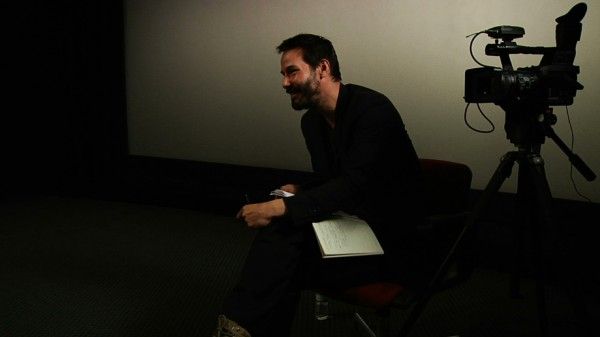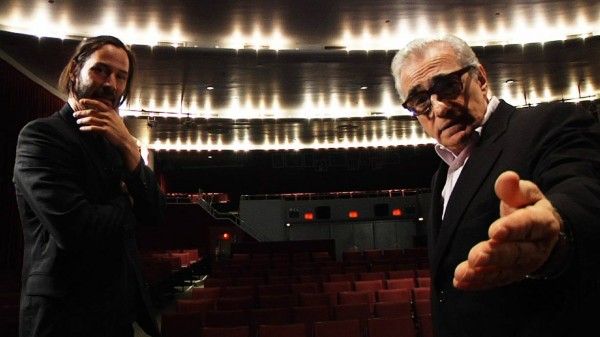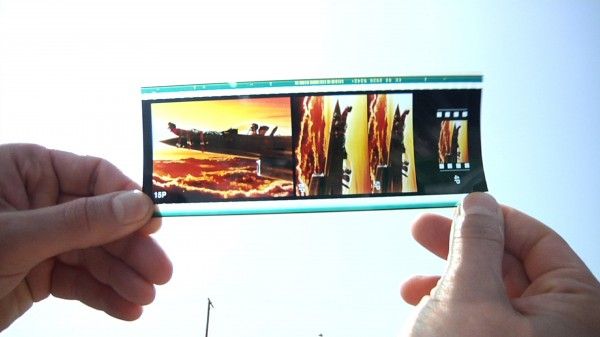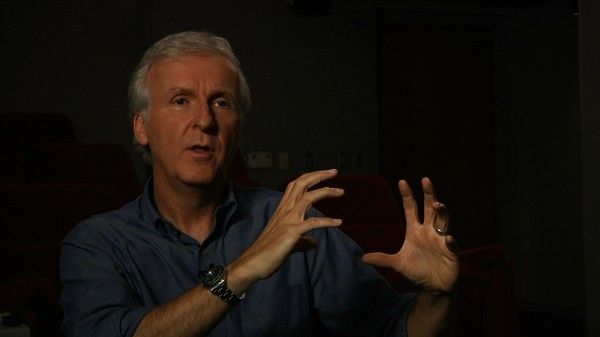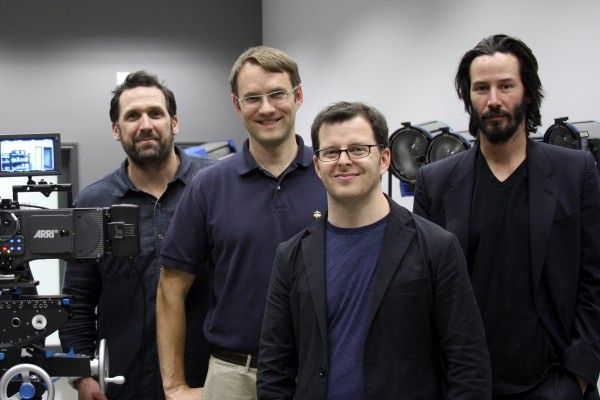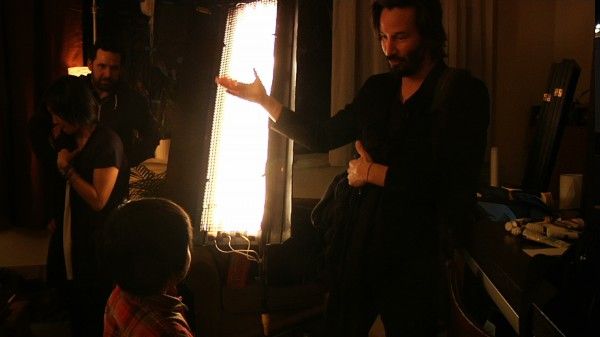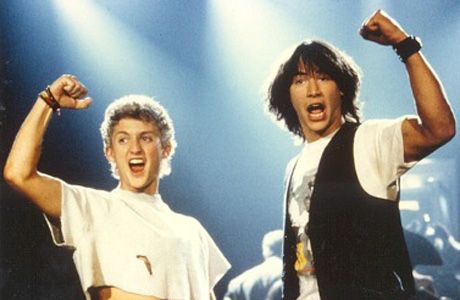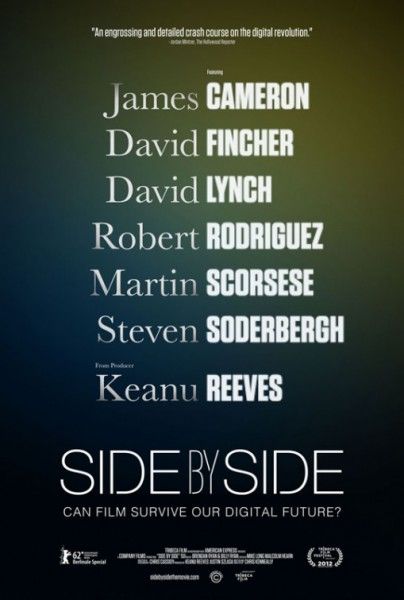Hollywood is in the middle of a digital revolution. Over the past few years, the titans of the industry have switched to digital cameras, and it seems like the days of shooting on film are drawing to a close. Of course there will always be holdouts (Christopher Nolan), but as digital cameras get more and more advanced, you have to wonder how long it will be before everyone has converted. These are the main issues explored in Keanu Reeves and Chris Kenneally's great documentary Side by Side. The two filmmakers sat down with people like James Cameron, David Fincher, George Lucas, Christopher Nolan, Martin Scorsese, David Lynch, Stephen Soderbergh, and Andy and Lana Wachowski to talk about the evolving landscape of filmmaking.  If you're a film nerd, it's a must see movie. For more on Side by Side, here's some outtakes and a trailer.Last week, I landed an exclusive interview with Keanu Reeves. Besides thanking him for getting the Wachowskis on camera, we talked about what surprised him about the digital revolution, how digital cameras and digital projection have advanced in the past few years, IMAX, whether it was tough to land the interviews, and so much more. In addition, with Reeves having directed his first feature, Man of Tai Chi, we talked about when people will see it, the film's rating (PG-13), and why he used the ARRI Alexa. Finally, we also talked about 47 Ronin, how he'd like to direct a film called Life and Art, the status of Bill and Ted 3, and Point Break Live (which is a lot of fun). Hit the jump to watch or to read the transcript.Here's the full video interview followed by the transcript. Side by Side is now available on VOD and in limited release around the country. For a listing of where it's playing, click here.
Collider: I have a lot of things I want to talk to you about, but the first is I want to say thank you.
KEANU REEVES: Okay.
You're probably wondering why.
REEVES: (laughs) Why?
I am a huge Wachowski fan, and literally your film is the first thing that they've done on camera for anyone in so many years. Was it challenging to get them to agree talk about this or is it something that is close to their hearts?
REEVES: I can't speak for them; all I can say is that I am really grateful that they took the time to meet with me. And they have a wonderful passion, knowledge and experience in storytelling, in movie making, so for me to have the opportunity to speak about this subject, film and digital, and then broadening that into archival, or starting to speak about the experience of watching a movie. It just kind of opened up. To be able to speak to people who have such knowledge and passion. I don’t know why they said yes, but I'm really happy they did.
Since you talked to them about this, they have talked a little bit on camera about Cloud Atlas. I think you got them a little more camera ready.
REEVES: No, no. Lana and Andy had done a documentary on some other work that they were doing, so I think there was a little sympathy towards a documentary filmmaker saying, “Would you please speak with me?† They had gone through that. I think that might have helped. They're such wonderful people, and it’s great that they're sharing that with us.
I've been doing set visits for four or five years now and one of my staple questions to directors is film or digital and why? Half of the people are always looking at me like, “why are you always asking this question?â€Â But I've been fascinated by this changing tide in Hollywood for years. What did you learn that surprised you about what was going on in the business, or was there anything that surprised you?
REEVES: One of them was archival. Another thing that surprised me was David Lynch saying – I won’t hold you to it David - but he might not work in film again. Tom Rothman [the CEO] of Fox saying there's five years left, from his perspective, for film. That's a short clock. It really surprised me when Arriflex announced that they weren’t going to make film cameras anymore. Speaking with Technicolor and how that business is changing, in terms of they're not going to make film anymore. Print, you know, or not so much. The documentary speaks about all of this industry change. It’s like, what are we losing, what are we gaining? One of the surprises was the interpretation of gaining. The opportunity for different screens, the democratization and then, that turning into the philosophy of what are we watching?  How do we watch it?  What do we want from what we watch?  What does it deliver?  What are the expectations?  That, I think, is full of surprises. A new audience, a new way to watch a movie. And I don't have any answers to that.Â
Roger Deakins saying that he's going to shoot on the Arri Alexa. And I spoke to Roger about this and he professed his love for the camera. When you have someone on that level saying, “I'm going digital.†I think that is where the tide is officially turning, where everybody is getting on board.
REEVES: In the early days, and still today to me, it’s a look. What look are you choosing to have, which way are you going? For Mr. Deakins, I don't know him, but to say, “OK I'm shooting digitally.†The look of it must be interesting to him; the process of using it must be interesting to him. That’s part of it. You said you've been asking people film or digital for the past four years? And that's what it is. How does it work? What does it look like? What does it do? In the documentary Christopher Nolan is kind of saying, “It's not there yet for me. What I do, digital isn't there yet for me.†And then for other people it’s right there, it’s right now.  And then technologically it always, as Lucas says, it’s going to get better. Wally Pfister talks about that.Â
Four or five years ago, with those early digital cameras, you could tell you were watching digital. But now cameras are evolving.Â
REEVES: And projection.
That's what I wanted to open the door on, projection. I, personally, have no problems looking at a digital image that's been shot, but when the digital projection is not as good as it should be, that is where the whole thing falls apart.
REEVES: Yep. It really does. It does. When we speak about this, it's like practical philosophy. When you know what you've lost, you’re like, that's not as good an image. But it’s a different image. Does it matter? You know what I mean? You want to have a standard. You want to have the standard of a beautiful print or the standard of a digital image with a projector that has the light bulb at the right lumens, and the screen in the appropriate screen, and all those things to have it technically right and beautiful; because that's important.Â
I think that digital projection, they have to solve that issue. I've gone to some screenings where I'm looking at an image that doesn't seem as focused as it should be. And even if it was shot on film or digital, because the projection is off, it’s just angering.
REEVES: Yeah, because you don't get in. You don't get involved. It doesn't grab you. There's a surface quality to it, there's no depth. It doesn't touch you the same way; it doesn't reach you the same way. And what Nolan says, it’s not acceptable. It’s not acceptable. It’s a big thing; I paid some dough for this. And his question is why is this being shoved down our throats? I'm now losing the choice to have this excellence. Now it’s kind of going a different way. But the projector and image, digital or photochemical has always been that thing with the bulbs and all of that. Scorsese talks about it in the documentary, he’s the real main auteur right?
I love Christopher Nolan and I love Wally Pfister, I love their work, but I think in five years when the cameras, maybe when an IMAX camera can go digital and the resolution is 8K and the image can be manipulated to look exactly like film, they're getting on board the train. I think that right now because it’s not all the way there. Maybe I'm wrong though.
REEVES: No, that sounds like a good reason to not be there, it's not as good. No, it's different though.
I want to open the door on you as a filmmaker. Not only have you done this, you are directing or have directed something.
REEVES: Yeah, I just finished principal photography on a kung fu movie shot digitally.
And that's what I was going to say, as I have for four or five years now, film or digital and why?
REEVES: Originally, going into the project I was hoping and expecting to shoot on film. But I shot in China, in mainland China, in Hong Kong. And basically from the producer's side of it there was a question, resources really, I shouldn’t say producer. Resources is like OK film cost this much, digital cost this much. What is our quality control going to be like where we are, and what affords us the best? So I tested some cameras and some film stocks and I decided to shoot digitally. And I'm really happy with that.
What camera did you use?
REEVES: I used the Arri Alexa studio camera. The 4:3 chip; with some Hawk lenses.
A lot of film makers are using digital cameras with old school seventies lenses to give it a different look.
REEVES: Yummy. Well, yeah, because it creams it up a bit. It's weird when you talk about film or the image it kind of turns into wine. You use things like “it’s robust, the bouquet, the grape, the way it falls off, the chocolate, the cinnamon, and the earthy tones.â€Â And that's like, what the heck is that? So you're talking about film and digital; it’s not as creamy, the edges, it doesn't flow, it has no depth. What are those qualities? So, it’s kind of funny. We used pretty fast lenses, the Hawks, you know, they were new anamorphics. We chose anamorphic. On the digital it’s a great combination, it’s a yummy, yummy image.
You have some titans of the industry in the documentary. Did you personally call these people up or did you have someone do that for you?  Because you got people to talk that normally don’t talk.
REEVES: Side by Side is an expedition for me and for Chris Kenneally. When we were in Technicolor in New York, I said “Wow, this is changing lets go do this. Chris do you want to go do this? It's really personal.â€Â Chris said, “It may be personal, but we have to make this for everybody, this is for the specialists, for the general audience. It’s about movies, movie making, it’s a behind the scenes.† So, for me, the people that we approached, it was personal.
I'm really excited to see your movie. I'm curious, opening the door on doing a documentary like this, now making a martial arts feature are you now stepping behind the camera more? Are there other documentaries or subject matter that has always interested you that you might open the door on?
REEVES: Yeah, I'd like to. As with anything, you need the story. If the film that I'm working on now is any good, I might get a chance to do it again. Even if it’s not, if I have a story to tell then I'll work to try to tell that story. Documentary as well. Off the cuff, I've always wanted to do something, I'd like to make something called Life and Art and speak to actors and talk about their films and their lives. Not in a sensational way, but just the interaction of this idea of life and art. “So Jack, while you were making this movie, what was going on? What is happening here? What was going on artistically in your mind? What's your approach to the acting here?†Something like that.
You need someone on your level, someone who also has the respect of the people you're talking to, to have people open up and engage. Which is why I think Side by Side is so good. You know what I mean; the people are looking at you as a level peer.
REEVES: Yeah, absolutely. I think that helped once and a while; that they might be familiar with some of the work I had done. You know, I've been around for a little bit.Â
I think you've done a few things people have seen.
REEVES: A couple of things.
Right, just one or two.
REEVES: Yeah, and hopefully liked. So, yeah, I think absolutely. I think also, it’s like it would be like in sports or anything. I hope that could be true, if I get to do Life and Art.Â
I think you could probably make that happen, with digital cameras I heard it’s cheaper.
REEVES: It is. I mean, that’s another consequence of digital right? There's this kind of renaissance of the documentary.Â
Oh, a hundred percent; and the quality that's coming out of TIFF and Sundance and everything is really great because of the cameras. But, I definitely want to ask you about your film. Did you direct it for an R rating? For a PG-13?
REEVES: I went through the PG-13 lenses. The film is mostly in Mandarin, it’s about seventy percent Mandarin, fifteen percent Cantonese, and the rest in English.
When can fans look forward to seeing a trailer?
REEVES: Yeah, well if it all goes according to plan hopefully sometime early next year.
Do you have a plan for when you want to release it?
REEVES: Yeah, maybe hopefully around May; May, June – April, May, June; if everything goes according to plan.
I believe early next year, you have a movie called 47 Ronin coming out.
REEVES: Yes, yes.
Have you seen a rough cut yet?
REEVES: I haven't seen anything, no. You know, on set I've seen some sizzle reels and some collections of some of the images. It looks absolutely astounding, and beautiful, and incredible.
On Twitter I got about a thousand people, when I said I was talking to you, everyone wanted to know. Do you actually think a Bill and Ted movie might happen? The amount of people that tweeted me is crazy.
REEVES: People like those films, I love those films.Â
Personally, I'm of the opinion this is never going to happen, ever, no matter what anyone says. But I definitely want to hear it from you if you think something could happen.
REEVES: Yeah, there's definitely a possibility that it might happen.
That's a nice politician answer. I like that.
REEVES: Yeah.
I've heard rumors that you actually went to the “Point Break Live†that exists in LA.
REEVES: You know, I never saw that.Â
I saw it recently, and it blew my mind. It's just fantastic. It was so much fun, they have the audience come up, there's a lot of participation, there's a lot of water. But there was a lot of hearsay about “Keanu's actually been here, he did this.â€
REEVES: Oh, no I haven't done it yet. I should do that, because that would be fun. I would have to play Bodhi or something like that.
Is there a possibility you would even explore going to it? Because people would lose their minds.
REEVES: Sure, yeah, sure.
Let me know when you're going.
Okay. Maybe when they have an anniversary. Like the fifty year anniversary or something like that.Â
Cool. Congratulations to you on the film. It's fantastic. Both film nerds and non film nerds should really check it out.
REEVES: Oh, thanks for that. I hope so.
Side by Side is now available on VOD and in limited release around the country. For a listing of where it's playing, click here.

